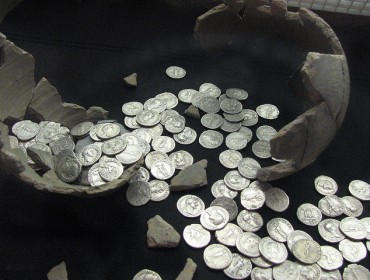
American Idols
18th Sunday after Pentecost
Lectionary Reflection –
For great is the LORD, and greatly/ to be praised;/he is to be revered above/all gods./For all the gods of the peoples are/idols,/but the LORD made the heavens. Psalm 96:4-5
Give therefore to the emperor the things that are the emperor’s, and to God the things that are God’s. Matthew 22:21b
What are the contents of your wallet right now? You won’t usually find much in mine—my driver’s license, debit card, insurance information, a couple of discount cards, a few coins, and, right now, eight dollar bills. I make it a habit not to carry much cash so that I am not tempted to spend my money frivolously. It helps me to avoid confusing needs and wants in the face of an assault of dazzling displays and alluring advertisements. I don’t want to be defined by the clothes I wear, the car I drive, or the stuff I possess. In short, I do not want to have any American idols.
False gods abound in our culture; I’m certain you can rattle off a goodly number. We revere and try to emulate the success of celebrities in everything from our fashion choices to our home décor. We spend hours and dollars on following our children’s sports teams and providing them with equipment. We tune in religiously to our favorite TV shows every week and hang our hats on the words of our most trusted pundits. Even the cross can become a false idol when it is reduced to “bling†and a hollow symbol/fashion statement.
In this week’s gospel reading, the religious leaders are still trying to entrap Jesus. He’s upset their temple market apple cart, exposed their inconsistencies, and thoroughly ticked them off. Finally, they come up with the idea of asking him how he feels about paying taxes to the Roman Empire, the evil oppressors. Does paying tribute to the state cause one to break religious law? Since Caesar set himself up as “god†one might assume a good Jew should not acknowledge this title by monetary tribute. In fact, it was unlawful for a Jew to carry Roman currency into the temple.
I guess to 21st century Americans, one might liken it to supporting executive bonuses and pay raises on the broken backs and empty pocketbooks of the elderly and impoverished or buying the products of a company whose corporate values are in opposition to one’s moral and ethical beliefs. These examples are not exact analogies, but maybe you can find links and examples that work in your context beyond tax reform and politics. I think the text goes much deeper, to the very heart of our allegiances.
Jesus asks for a coin of the realm—a denarius. It likely featured the bust of the emperor Tiberius, serving as a tacit and annoying (for the Jews) reminder of just who held the power. Jesus’ answer is priceless: “Give therefore to the emperor the things that are the emperor’s, and to God the things that are God’s.†Huh? What does this mean?
Well, for one thing, it got the religious leaders off his back for a verse or two. It’s given scholars and preachers a lot of fodder for discussion. It is also a question that’s all too easily dismissed. I think we need to wrestle with this one in light of our “American idols,†our false Gods, and our notion of whose we really are.
As Christians, we confess that we believe in “God, the father almighty, creator of heaven and earth.†We ask God’s will to be done in the Lord’s Prayer, and we sing “Holy, Holy, Holy.†I guess we need to figure out if this is lip service or a life of service. Is God really Lord of all creation—including us?
The implications of answering this question could have us, like the religious leaders of Jesus’ day, “amazed†and exiting stage left, or it can change our lives and bring about radical transformation in our discipleship walk. Answering this question also requires that we spend some time figuring out what it means to live faithfully in the world but not be of the world. Finally, it means clearing out whatever “idols†prevent us from giving to God the things that are God’s—i.e. everything.
For me, the challenge to acknowledge and break the power of their sway is a process that requires regular attention. Wise preachers and teachers might do well to call their faith communities to do the same. After all, idols are not real; they only have the power we give them.
Blessings on your textual tumbling, your faithful teaching, and inspired proclamation!
Photo by Helen in Wales used under Creative Commons License. Thanks!
Stewardship of Life
Thank you for printing this article!
You can view this article online at http://bit.ly/p7aok2.
© 2011 Stewardship of Life Institute
https://westrevision.stewardshipoflife.org



